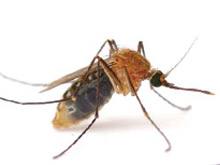Health Topics
-
Healthy Living
-
|
|
November 2009
|
| Chikungunya! Once Bitten... |
| Dr Seemanthini Desai |
| |
 |
After the floods, diseases spread by mosquito bites -like chikungunya - are on the rise Chikungunya fever is a debilitating viral illness that is caused by an insect-borne virus, Chikungunya virus (CHIKV). The term 'chikungunya' means 'that which bends up' in the Kimakonde language (an African language). This refers to the stooped posture of patients who are afflicted with severe joint pain in this disease. |
Day-time Bite
Chikungunya virus is spread by the bite of an infected mosquito. Mosquitoes become infected when they feed on a person infected with chikungunya virus. Infected mosquitoes can then spread the virus to other humans when they bite them. Aedes aegypti (the dengue fever mosquito), a household container breeder and aggressive daytime biter, which is attracted to humans, is the primary carrier of chikungunya virus to humans.
Known History
Chikungunya fever was first recognized in epidemic form in East Africa in 1952-1953. The virus was first isolated in Tanzania. In India CHIKV was first isolated in Kolkata in 1963. Following that, epidemics occurred in Tamil Nadu (1964), Maharashtra (1973), Andhra Pradesh and Karnataka (2005). As of April 29, 2009, the Directorate of National Vector Borne Disease Control Programme in India has reported over 2,700 suspected cases of chikungunya fever, with no deaths reported. The most affected areas are the Karnataka, followed by AP, Goa, and Kerala.
Symptoms
The incubation period (time from infection to illness) can be 2 to12 days, but is usually three to seven days. Chikungunya virus infection can cause a debilitating illness. Fever and severe joint pain are accompanied by chills and constitutional symptoms like headache, extreme sensitivity (excessive sensitivity to light), conjunctival infection, myalgia (muscular pain), fatigue (weakness), loss of appetite, nausea and abdominal pain. Migratory polyarthritis mainly affects the small joints of the hands, wrists, ankles and feet with lesser involvement of the larger joints. Erythematous rash may appear on day two or three of the disease and is most intense on the trunk and limbs, and may peel off as scales. Red spots under the skin (petechiae) are occasionally seen, but unlike dengue, this virus is not a regular cause of the hemorrhagic fever syndrome. A few patients may develop leucopenia (low white cell counts), mildly decreased platelet counts, elevated liver enzymes and C-reactive protein.
Acute chikungunya fever typically lasts for a few days to a few weeks, but as with dengue fever, some patients have prolonged fatigue lasting several weeks. Additionally, some people continue to experience incapacitating joint pain and recurrent joint effusions for several months to years. Very rarely the disease becomes fatal by producing complications such as meningitis and encephalitis (infection spreading to the brain).
Pregnancy and Chikungunya
Pregnant women can become infected with chikungunya virus during all stages of pregnancy and have symptoms similar to other individuals. Most infections occurring during pregnancy will not result in the virus being transmitted to the foetus. The highest risk for infection of the foetus/ child occurs when a woman has virus in her blood at the time of delivery. There are also rare reports of first trimester abortions occurring after chikungunya infection. Currently, there is no evidence that the virus is transmitted through breast milk.
Diagnosis
Chikungunya is diagnosed by ELISA blood test (same as that for HIV AIDS screening). Blood test is the only reliable way to identify chikungunya since the symptoms are similar to much more deadly dengue fever. Also cooccurrence of these diseases is seen in many places.
Treatment
There is no specific antiviral treatment currently available. Treatment is symptomatic and can include rest, fluids, and medicines to relieve symptoms of fever and pain. Aspirin should be avoided during the acute stages of the illness. In arthritis not responding to analgesics, Chloroquine is recommended. Infection appears to confer life long immunit
Preventing Chikungunya
The best way to prevent chikungunya virus infection is to avoid mosquito bites. There is no vaccine or prophylactic drug currently available.
- Unintentional delay or missing meals (especially shopkeepers, those in the entertainment or hospitality business that have long working hours at this time)
- Unusual physical activities like cleaning the house or shops
- Excessive drinking of alcohol
Usually one may feel shaky, sweaty, confused, hungry, bad tempered or light headed during hypoglycemia or low blood sugar. Take quick acting foods like two or three tea spoons of sugar in tea or water, or two to three glucose tablets, or a glass of fruit juice or a chocolate bar. Once you feel better, eat a proper meal. |
|
|
 |
Dr. Seemanthini Desai is Consultant Microbiologist at Apollo Hospitals, Bangalore |
|
|